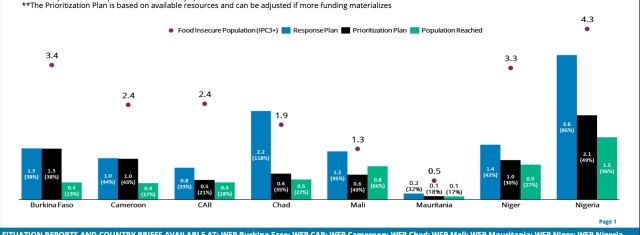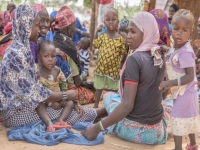News
Food Insecurity Crisis in West Africa: WFP Strives to Aid
Amid Growing Challenges

(Source: WFP)
August 28, 2023
Key Points:
* 47.2 million people projected to face food insecurity in Western Africa during the 2023 lean season.
* WFP identifies 11.6 million people requiring emergency assistance across eight majorly affected nations.
* Limited funding forces WFP to prioritize aid for 7.2 million, leaving many vulnerable groups with reduced assistance.
* G5 Sahel nations have seen a surge in food insecurity, almost tripling since 2019.
* Burkina Faso and Mali have 45,000 individuals on the brink of catastrophic hunger.
* Supply chain disruptions exacerbate the crisis, with export bans by Nigeria and Niger and border closures due to Niger's
military coup.
Key Points:
* 47.2 million people projected to face food insecurity in Western Africa during the 2023 lean season.
* WFP identifies 11.6 million people requiring emergency assistance across eight majorly affected nations.
* Limited funding forces WFP to prioritize aid for 7.2 million, leaving many vulnerable groups with reduced assistance.
* G5 Sahel nations have seen a surge in food insecurity, almost tripling since 2019.
* Burkina Faso and Mali have 45,000 individuals on the brink of catastrophic hunger.
* Supply chain disruptions exacerbate the crisis, with export bans by Nigeria and Niger and border closures due to Niger's
military coup.
Amidst the challenging environment of the 2023 lean season, Western Africa is grappling with a concerning rise in food insecurity, affecting a staggering 47.2 million people. A report released by the World Food Programme's Regional Bureau for Western Africa highlights the dire situation in the G5 Sahel countries, Central African Republic, northern Cameroon, and North-East Nigeria.
Of these nations, approximately 19.2 million individuals have been deemed in urgent need of assistance. However, limited resources, combined with the urgency of the situation, mean that the WFP can only prioritize 7.2 million of the 11.6 million identified as requiring emergency aid.
The challenges facing WFP's relief efforts are multifaceted. While funding shortages have played a significant role in constraining the scope of assistance, supply chain breaks, growing insecurity, and loss of livelihood further exacerbate the situation. Despite their relentless efforts to reach all individuals in need, the WFP's constraints have led to some receiving reduced rations.
Of these nations, approximately 19.2 million individuals have been deemed in urgent need of assistance. However, limited resources, combined with the urgency of the situation, mean that the WFP can only prioritize 7.2 million of the 11.6 million identified as requiring emergency aid.
The challenges facing WFP's relief efforts are multifaceted. While funding shortages have played a significant role in constraining the scope of assistance, supply chain breaks, growing insecurity, and loss of livelihood further exacerbate the situation. Despite their relentless efforts to reach all individuals in need, the WFP's constraints have led to some receiving reduced rations.
A particular concern lies in the G5 Sahel countries, where the number of those facing food insecurity has grown from 3.7 million in 2019 to an alarming 10.2 million in 2023. The geographical expanse of areas repeatedly facing food scarcity has also grown by nearly 30% since 2018, with conflict-affected regions in Burkina Faso and Mali harboring 45,000 individuals teetering on the edge of catastrophic hunger.
To add to the complexity of the situation, WFP's operations face significant hurdles due to supply chain challenges, primarily resulting from export bans by Nigeria and Niger. Moreover, the military coup in Niger this July has led to a border closure, disrupting essential food deliveries to Burkina Faso during a critical period and worsening the food security of the region's most vulnerable populations.
The unfolding crisis underscores the urgency for international collaboration and assistance to mitigate the growing food insecurity challenges in West Africa
To add to the complexity of the situation, WFP's operations face significant hurdles due to supply chain challenges, primarily resulting from export bans by Nigeria and Niger. Moreover, the military coup in Niger this July has led to a border closure, disrupting essential food deliveries to Burkina Faso during a critical period and worsening the food security of the region's most vulnerable populations.
The unfolding crisis underscores the urgency for international collaboration and assistance to mitigate the growing food insecurity challenges in West Africa
Source:
World Food Programme. (2023, August 28). WFP Regional Bureau for Western Africa: Lean Season Response Burkina Faso, Cameroon, Chad, CAR, Mali, Mauritania, Niger, Nigeria - August 2023. ReliefWeb. https://reliefweb.int/report/burkina-faso/wfp-regional-bureau-western-africa-lean-season-response-burkina-faso-cameroon-chad-car-mali-mauritania-niger-nigeria-august-2023
World Food Programme. (2023, August 28). WFP Regional Bureau for Western Africa: Lean Season Response Burkina Faso, Cameroon, Chad, CAR, Mali, Mauritania, Niger, Nigeria - August 2023. ReliefWeb. https://reliefweb.int/report/burkina-faso/wfp-regional-bureau-western-africa-lean-season-response-burkina-faso-cameroon-chad-car-mali-mauritania-niger-nigeria-august-2023
more information: https://www.arac-international.org/2023/08/food-insecurity-crisis-in-west-africa.html
Liability for this article lies with the author, who also holds the copyright. Editorial content from USPA may be quoted on other websites as long as the quote comprises no more than 5% of the entire text, is marked as such and the source is named (via hyperlink).






